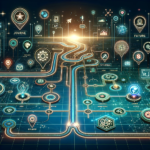The Transformative Power of Artificial Intelligence in Modern Industries
What is Artificial Intelligence?
Artificial Intelligence (AI) refers to the simulation of human intelligence in machines that are programmed to think and learn like humans. The term can also be applied to any machine that exhibits traits associated with a human mind such as learning and problem-solving. The ideal characteristic of artificial intelligence is its ability to rationalize and take actions that have the best chance of achieving a specific goal.
Revolutionizing Industries with AI
AI’s integration into various sectors such as healthcare, finance, automotive, and education has catalyzed significant advancements. In healthcare, AI algorithms can predict patient diagnoses faster and more accurately than many medical professionals. In finance, AI is used to detect and prevent fraud in real-time while also automating trading activities. This section explores specific cases where AI has been a game-changer.
AI Technologies: Deep Learning and Machine Learning
At the core of AI’s capabilities are machine learning (ML) and deep learning. Machine learning algorithms use statistical techniques to give computers the ability to “learn” with incoming data and to identify patterns and make decisions with minimal human intervention. Deep learning, a subset of ML, utilizes neural networks with many layers (hence “deep”) to analyze various factors of data inputs.
Challenges and Ethical Considerations of AI
Despite its benefits, AI presents several challenges and ethical concerns. Issues such as data privacy, surveillance, and the automation of jobs are among the top concerns. Additionally, as AI systems become more autonomous, the risk of loss of control over these systems increases. Addressing these concerns is crucial for the responsible development and deployment of AI technologies.
Looking Ahead: The Future of AI
The future of AI promises both exciting innovations and significant challenges. Upcoming advancements are likely to revolutionize the way we interact with our environment, making devices and services more personalized and efficient. However, managing AI’s impact on society will require robust ethical frameworks and regulatory policies.

